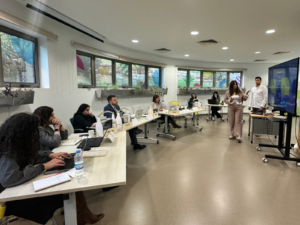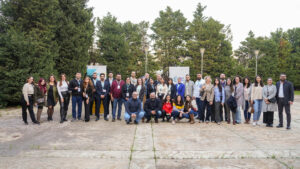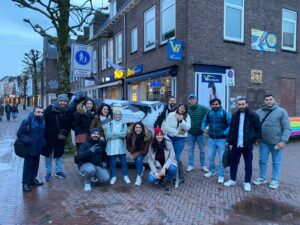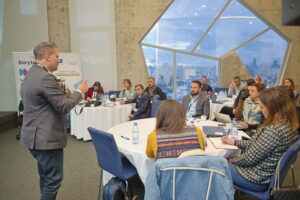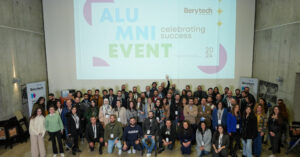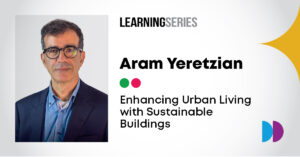
From nurse, to research manager, to HR director, to an INSEAD’s executive MBA graduate, to co-founder and deputy managing director of APIS, a consultancy company that delivers high-end healthcare projects, Randa Rustom could be a role model for every woman making her way through the entrepreneurial world.
In 2012, driven by her urge for growth and self-achievement, Randa partnered with Joseph Otayek, her former boss and CEO of Hotel-Dieu de France in Beirut for 17 years, to create APIS. They rented offices in Berytech and relied on their wide network and extensive experience in healthcare to launch into the health consulting industry. Otayek is a healthcare veteran, a mechanical engineer and a biomedical engineer holding an MBA from INSEAD. His regional reputation in the healthcare industry landed them their first consultancy job.
“We were contacted by a local institution with 2 running hospitals. Both succeeded after our intervention to have healthy finances and operations,” explains Randa. After the initial assessment, APIS was then hired to create systems and procedures, set best practices for management, cost control, performance monitoring and to coach the upper management. “We based our work on our expertise and our experience, our biggest asset was and still is our flexibility. The positive part of our journey was that we were not change resistant.”
Randa confirms that the first thing you learn as a startup is that your strength is the strength of your team: “Your success relies on having a good team, even if your offerings are not well defined yet! The first phase of a startup is not easy. If the team is not synchronised, if it does not have the same values, your startup will not go very far.” A synchronized team communicates; communication is key to overcoming obstacles. Randa’s advice on this: “Set a daily debrief to communicate, correct and move forward.”
Even as the APIS team grew, the rules for joining APIS remain the same: “We hire people we feel a connection with, who are experts in their fields, who share our values, who are humble and humane, and who help us create long term relationships with our clients. We look for people who are different in their perception, who would challenge our ideas and come up with something greater.”
“From our first consultancy we created internal systems, frameworks and tools. Our concern was to get a tool out of every experience that is replicable so we would not invest more time on that same exact experience in the future. This is how we created our business model,” explains Randa.
APIS was then contracted by ‘Doctors Without Borders’ to set the systems and operating models for the reconstructive surgery hospital that the organization was managing in Jordan. The hospital was created to care for war victims from Iraq, Syria and Yemen who are not able to receive proper treatment in their country. It was the second fixed hospital for this NGO that is known to operate from field hospitals.
The next project was to organize a chain of eye hospitals in Egypt. The chain received the JCI accreditation for achieving peak performance, a proud achievement for the APIS team. “We are very hands on in our job,” insists Randa, “We all come from a technical background. We’ve lived the hospital. We know the hospital. When we are consulting for a hospital, we understand exactly their pain points and their needs because we’ve already been there. This expertise is what drives people to contract smaller consultancy firms like us.”
That same expertise led the Health Authority of Abu Dhabi to request a bid from APIS to train their personnel. The project was an exciting challenge and an extra service to add to APIS’s growing portfolio. The whole team had teaching experience and winning the bid meant creating a training program from scratch, which opened new opportunities for the company. “We started preparing trainings and we found that senior management trainings can be very interesting to offer as an added service, so this is how we built our training modules.”
Today, one of APIS’s core business is healthcare facility planning and design review, the latest and greatest addition to the company’s profile. APIS won a bid for a major public hospital of 1000 beds in Kuwait to review its architectural design and medical equipment according to international and national standards. The APIS team took on that challenge and built the model of the health care facility planning service.
Health care facility planning services bring in long-term contracts that provide the company with much needed financial stability. Hospitals in Kuwait and Lebanon are next in the pipeline.
Randa simplifies the explanation of medical planning and health facility design: “The first stage of building a hospital requires a study of the hospital’s concept, targeted clientele, and composition, how many operating rooms to add, how many emergency rooms, where to place the storage rooms, etc… We create the study that sets the specifications and the operating model of the hospital. The second stage is design review. The architect takes our study, implements it in his design and sends us the architectural drawings for approval according to international and national standards and our best practices. At a third stage, when the hospital opens, we help set up the operations, we help define the governance model and the strategy, define and implement the organization, provide training for the management, we can sit on the board, we can do performance monitoring, we can coach the CEO, the director of nursing, the medical director and the administrative directors, etc…”
After 5 years of tenancy in Berytech, APIS has moved into their new offices in Badaro. “Badaro is up and coming, it’s busy and very central. Nevertheless, we sometimes miss the facilities we had in Berytech: the internet connection, the maintenance, the parking spots all the way up to Aphrodite, the site manager,” says Randa with a smile.
Beyond the challenges of running an office in an uncertain country, Randa faces other types of professional challenges daily. Being a woman entrepreneur in an industry led almost entirely by men in a region that is heavily dominated by a patriarchal culture, she has to put in double the effort to be heard and revered. “I thought it was going to be harder being a woman entrepreneur in the Middle East. Still, in Lebanon, a woman needs to work twice as hard to prove herself. A man always comes with a little extra..” Randa acquired her leadership skills from the coaching she received at INSEAD, a business school that has shaped and molded her into becoming a better manager and decision maker. “ The first few weeks at INSEAD were a cultural shock to me. I acquired a strong compassionate approach from years of being a nurse, from being near people. At INSEAD, I came in contact with fellow colleagues who were fierce managers and CEOs. I believe that eventually they taught me how to be more cut throat and I taught them how to be more humane.”




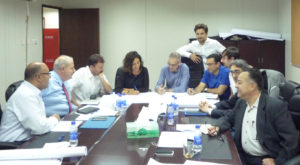
![IMG_1262[2]](https://berytech.org/wp-content/uploads/2016/06/IMG_12622-300x225.jpg)
